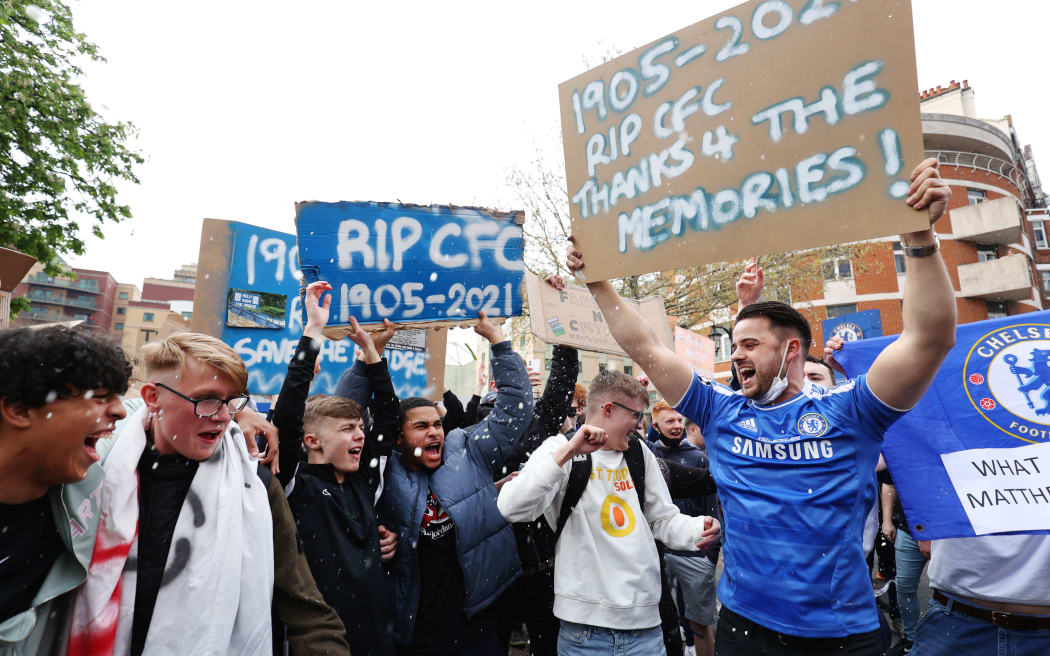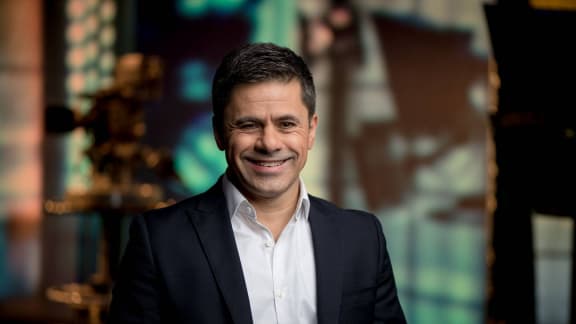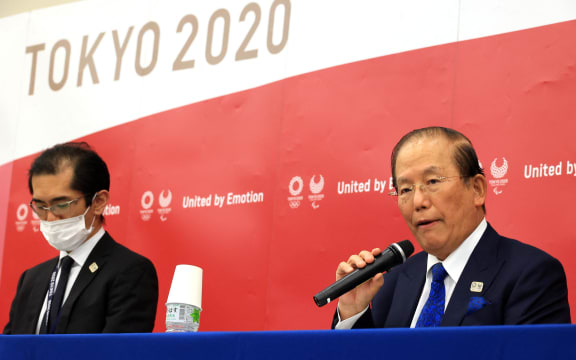A core part of your business is screening the world’s sport to customers keen enough to pay for it. Then Covid stops almost all of it stone dead. What do you do? Mediawatch asks a Sky exec how they handled that - and the threat of Covid chaos hanging over the Olympics and this week’s ill-fated effort to fire up an elite European football league.

Photo: PHOTOSPORT
The billionaire owners and chairmen of 12 of the world’s biggest football clubs met in secret to sketch out a new league of their own - a closed shop which would guarantee them the biggest revenues in the sport year-after-year.
Then they announced it last weekend without warning their own managers and players - let alone the hundreds of millions fans around the world who follow their clubs in action.
What could possibly go wrong?
The revolt was immediate among players players past and present - and the fans. One by one, the backers of the European Super League backed away from their own plan.
On RNZ’s Morning Report, The Sun’s sports editor Martin Lipton said their blueprint for the future of the elite level of the world’s most popular sport turned into “a bag of wind within three days.”
John W Henry, boss of the Boston-based Fenway Sports Group who owns Liverpool FC issues a groveling apology.
Among those taken by surprise was Sky TV, which broadcasts the UEFA European Champions League - the competition that would have been gutted by the new creation.
For more than a decade, Tex Teixeira has been Sky’s Director Sport and Broadcasting and then its chief of content.
For 20 years before that he worked for South Africa’s pre-eminent pay TV outfit SuperSport.
“This is a stark reminder for everyone - including us - that it’s all about the fans,” he told Mediawatch.
He said his 82-year-old mother who lives in Portugal – and is a fan of Porto football club - was also appalled by the move.
“With social media platforms the fans have a united voice. If you’re not doing what they want they will tell you straight and they can change your business. We need to listen and respect that,” he said.
“I’m glad the fans have spoken and the powerful chairmen realised the fans deserve to be heard,“ he said.
The breakaway clubs were effectively proposing a franchise system in which all the teams would be back next year even if they performed poorly. But it’s the same in many US sports - like the NBA and NFL - and Super Rugby and the A-League, which Sky Sports broadcast exclusively here.
“But I don’t think that’s what football is all about. It’s about the smaller clubs getting an opportunity and proving themselves,“ said Teixeira.
Last week Texeira was appointed to a brand new role at Sky - Director of Live Sport Innovation and Community Engagement.
The European Super League fiasco is a case study in what goes wrong when you don’t engage with the outside world.
But Sky TV is a pay-TV broadcaster that simply offers up sport and entertainment to customers to turn a profit. Does it really need to bother trying to ‘engage’ the community?
“That word community can mean different things. For example, schools are a community that we would like to work with. The metropolitan areas are a community whereas rural New Zealand is different. Then we have the Pasifika community and Māori communities - and women's sport could be regarded as a community too,” he said.
“What we’re saying is it’s not ‘one size fits all’ and the more time we spend out there understanding their challenges and interests the more opportunity is out there for us,“ he said.
The statement announcing his new role at Sky TV said he will have a special focus to try the quality in women’s sport and encourage participation in sports across the country.
These changes are taking place under Sky’s first ever female chief executive, Sophie Moloney .
“With women's sport, we have embarked on this already. This year we will be showing the entire Farah Palmer cup. Our entire presentation team going to the Olympics will be female and that’s a first for us. We are looking at creating a lot more content around women stories. We have adopted the phrase ‘side-by-side’ for women's sport and men's sport. We do one thing for one, we do the same for the other,“ he said.
“At the same time we have to remember we have a customer base that is used to seeing - and pays us to see - certain things. We need to find a balance that works for current customers, but also others and casual fans who see what we do,” he said.
Tomorrow's fans and viewers

Tex Teixeira, Sky TV's Director of Live Sport Innovation and Community Engagement. Photo: supplied/
One of the European football bosses who is not apologising for the breakaway league proposal is Andrea Agnelli, the boss at the top team in Italy, Juventus.
He said they have to act to attract a new generation which doesn’t watch live sport and is more interested in football commuter games where the likes of Liverpool, Real Madrid, Milan or Barcelona can be paired up whenever the user likes.
He even spoke of the games as a “simulation” of what the super-clubs like his could provide for the new generation of fans.
Is the the reason for rescoping Tex Teixeira’s role at Sky to include ‘Live Sport Innovation”?
“Agnelli is right about that,” Teixeira told Mediawatch.
“From the millennials down to Gen Z they are consuming differently and maybe not even consuming sport at all,” said Teixeira.
“Their interests might not be the same as ours. Their attention spans may not be the same. Financially they might not be able to afford what we can and they might not have the same amount of time as we have,” he said.
There is another reason the European football club bosses made their big play this past week - Covid 19.
For more than a year the stadiums of these teams have been empty, their competitions disrupted and their revenue from sources other than broadcast deals has shrunk.
Spanish super-club Real Madrid reportedly has huge debts - and it's not the only one.
The Games must go on?

Photo: AFP
There’s no sports event more buffeted by the chaos of Covid-19 than the 2020 Olympics - still called that even though the Tokyo organisers long ago ran out of 2020 in which to stage it.
They’re still saying it’ll be held in July this year though - kicking off less than 100 days from now.
A full schedule of events is online already, but it will be - as the New Zeland Herald this week put it 'the weirdest Games ever' - with few fans and no overseas guests. (Even the hospitality-hungry bigwigs in the IOC won’t be able to take along an entourage for the fortnight).
The British Medical Journal said the organisers are ignoring science and Prof Michal Baker from the University of Otago told Newstalk ZB last weekend the 2020 Games should be put off until 2022.
Tex Teixeira says that won’t happen.
“I don’t think they’ll go back on it now. I know how dangerous Covid is but I think the IOC will make this a symbol of how we overcome adversity,” Teixeira said.
He said Sky has scaled down its own team for Tokyo to just 17, compared with 25 sent to Rio in 2016. That includes a technical team covering the rugby matches and football qualifying rounds for the host broadcaster.
“Our teams can operate in a bubble which is safe and I think we have good plans to achieve that. I’m looking forward to it but to be honest there have been a couple of grey hairs that have come along,” he said.
A delay in the Olympics would be last thing Sky TV wants.
This past year they’ve struggled to keep sports on the air - in order to keep their subscribers - because many major competitions which usually fill up the hours on their huge number of live channels were suspended.
How did they fill the void?
“When we look back now I have to pat everyone involved on the back. It’s incredible what we were able to turn around in quick time by 500-plus people working remotely and a dedicated core of essential workers at Sky to serve the entire business,” he said.
Brand new shows were created such as Isolation Nation in which All Blacks and other sports stars locked down at home took part.
“All of a sudden we got this incredible access to players and they were so supportive. New Zealand Rugby also stepped up to help us try new things. Our rights holders helped us to create new things too,“ he said.

